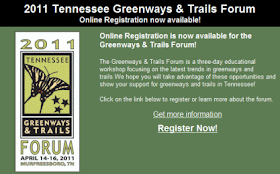Monday, January 31, 2011
Classes of bicycle facilities
Yes, it is true that a good deal of cycling is done for recreational purposes. But a good deal of cycling is also done for transportation, due to its convenience and low price, in addition to the built-in exercise. One who rides for transportation gets a workout just by going where one was going anyway. A variety of facilities exist, and facilities can be classified into three classes.
Sunday, January 30, 2011
Congress IS Changing
Friday, January 28, 2011
New Driver's License Manual Released
TDOT Long-Range Planning
Wednesday, January 26, 2011
Tell Congress About Bike/Ped
www.transportation.org/IToldCongress
Feel free to share this information,
Jessica L. Wilson, Bicycle and Pedestrian Coordinator
TDOT Long-Range Planning
Tuesday, January 25, 2011
Sunday, January 23, 2011
The importance of integrating networks
A technical illustration follows:
Friday, January 21, 2011
"New Ciclovia"-car-free Sundays
Wednesday, January 19, 2011
Job Opportunity - Knox County Health Department
The Knox County Health Department is seeking a Health Planner to lead projects focused on the built environment and health.
The application is available here. Deadline is January 28.
Monday, January 17, 2011
Thermoplastic Edge Lines
Grooved thermoplastic road markings may present a more bike-friendly alternative to rumble strips in terms of reducing run-off road crashes. The markings gently alert drivers to reaching the line, and they're not as loud. As an additional benefit, pavement longevity is not adversely affected by them, unlike the case with rumble strips. Bike/Walk Tennessee is proud to have assisted TDOT with this assessment.
Click here for copy of the report.
Friday, January 14, 2011
2011 Tennessee Greenways & Trails Forum
| The 2011 Tennessee Greenways and Trails Forum is a three-day educational workshop and your best opportunity to network with parks and recreation professionals and administrators in the state. This year's forum theme is "Building Connections." Forum sessions will be in Murfreesboro on April 14-16 and will highlight the impact of greenways and trails in our communities and discuss their role in uniting our citizens, improving health and combating obesity, promote economic development and tourism, provide alternative transportation opportunities and connecting people to nature. Click here for more information and registration! |
| Contact Info: Recreation Educational Services Jeni Brinkman, Assistant Director 615-532-0750 jeni.brinkman@tn.gov |
Tuesday, January 4, 2011
Job Announcement
Saturday, January 1, 2011
House votes to extend Federal trails and transportation funding to Sept. 30, 2011
"The Transportation Enhancements and Rec Trails programs have provided almost 10 billion dollars to states since 1992 for more than 28 thousand projects. Through the life of the Congestion Management and Air Quality Improvement program almost half a billion dollars have been spent on bike and ped programs.
The Federal Lands Highway Program continues to fund projects that provide access to and within Federal Lands. All of these programs benefit local economies, particularly in rural areas. And no one knows this better than you. The Hatfield McCoy motorized trail system in West Virginia, the New River and Virginia Creeper Rail-Trails in southwestern Virginia, the Paiute ATV trail system in Utah, the Monon Trail in Indianapolis, the growing transportation and recreational trail network here in Chattanooga, and the many trail offerings in urban and rural areas across the country help communities retain jobs, attract visitors and improve the quality of life for residents and tourists alike.
Trails provide transportation choices for communities and promote healthy, active lifestyles. They connect people to recreation and business destinations and help reduce greenhouse gas emissions by shifting motorists off congested roadways to more environmentally sustainable modes of transportation."
Mr. Beightel's full remarks can be found here.

